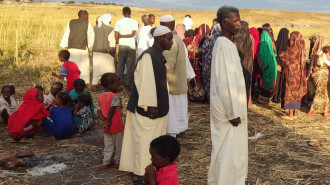
Jordan: Low demand for Covid vaccines spurs government intervention

The uptake of Covid-19 vaccines in Jordan has been lagging, due to a fear of side effects on the one hand and a failure of government to convince people of the importance of getting vaccinated and its positive health effects on the other. This may be connected to the low levels of trust which Jordanian citizens have in their government.
Jordan's vaccination rate remains low
Under 2.2 million Jordanians have taken both doses of one of the vaccines, whilst 2.9 million others have taken one dose. The Jordanian authorities announced last month that they had made an agreement to secure around 12 million doses of vaccines, and are in the process of ordering five million additional doses.
The government is trying to increase the number of fully vaccinated people in line with its previous pledges – to have vaccinated 4.5 million citizens by the beginning of September which would mean that 75 percent of the targeted groups will have been vaccinated. This is what the government deems an acceptable level of immunity in Jordanian society.
Government measures crack down on unvaccinated
To confront this crisis, Jordanian Prime Minister Bisher Al-Khasawneh has issued a defence order to regulate the work of employees who have not been vaccinated in both public and private sector institutions and some professions, which aims to pressure people to take it.
The uptake of Covid-19 vaccines in Jordan has been lagging, due to a fear of side effects on the one hand and a failure of government to convince people of the importance of getting vaccinated and its positive health effects on the other
Defence Order No.32 states that every employee in the public and private sector who has not had the first dose of the vaccine or who has delayed their second dose must show a negative PCR test every Sunday and Thursday which has taken place in the previous 72 hours: if they don’t they are not allowed to work and marked absent. Similarly, every public transport driver who has not had the first dose must do a PCR test regularly and be able to provide evidence of a negative result during his work hours (taken in the last 72 hours).
The punishment for those who violate these conditions is a fine of between 100 Jordanian dinars ($140) and 500 JOD (around $700), with the fines rising with each offence. Educational institutions which violate these regulations will also be fined: between 1,000 JOD ($1,400) and 3,000 JOD ($4,200).
Another measure introduced to increase vaccine uptake is the Ministry of Health’s decision to lower the age threshold for vaccinations to 12 as long as their guardian agrees (the 12-18 age group was not targeted in the beginning).
|
|
Conflicting views on vaccine
Ahmad Sa’ad, who is in his early 70s has not taken the vaccine and does not want to: “I am scared of the possible side effects, and I don’t trust the government’s reassurances about it.”
Muhammed Al-Abbadi, a fellow Jordanian, has similar views – he doesn’t trust the government advice very much: “I don’t want to take the vaccine, and my wife feels the same. No one can force us to take it.”
On the other side, Maha Al-Zu’bi, who is an employee in her fifties says that she got vaccinated because she is convinced that it will provide relative protection against the disease, as well as the fact that, “the vaccine has become necessary now the government has taken measures against workers who are not vaccinated.”
Ahmad Al-Naimat, also in his fifties, agrees with her. In his opinion: “All citizens should have the vaccine regardless of what the government procedures are, in order to protect our society from the spread of the disease. Many families have seen loved ones fall sick with the virus; others have lost someone. This should push people to get vaccinated to protect themselves and those they love, especially as we are seeing new variants appear.”
In a related context, the Secretary-General of the Health Ministry for Epidemiological Affairs Adel Bilbeisi, who is in charge of the Kingdom’s coronavirus response says that the government is trying to fully vaccinate 4.5 million people by the start of September.
"Many families have seen loved ones fall sick with the virus; others have lost someone. This should push people to get vaccinated to protect themselves and those they love, especially as we are seeing new variants appear"
“Whenever we take a step forward, we get a little bit closer to the goal of achieving a collective immunity in our society,” he explains.
Bilbeisi points out that the number of those getting vaccinated has risen to almost 100,000 people daily, and that this seems to be a result of the recent government decisions, as the reduction in age and Defence Order 32.
Regarding the reasons why the vaccine uptake has been low, Bilbeisi says there are many, and explains that in a recent questionnaire sent out by the Ministry of Health, it was clear from the answers that one of the main reasons for reluctance to get vaccinated was that people were preoccupied with their jobs, and also that those who had had covid did not come forward for the vaccine. Additionally, there was a fear around the risk of side effects.
Continuous monitoring and preventative measures
When asked how he thinks the current situation is going, Bilbeisi says: “The increase in cases and positive tests in recent days is worrying,” acknowledging that preventative measures have been relaxed among ordinary Jordanians. However, he says that in light of a loosening of regulations and workplaces opening up again, the situation until now is within the realms of what they had expected.
He does not think it likely the Ministry will step back from these decisions, but it will continually monitor the situation, and based on this, may re-adopt a number of preventative measures with the hope that that the country will not see a large increase in cases.
“If we want to go back to normal life and reopen the economy, we have to commit to preventative measures, such as wearing masks and other practices, which are not being observed as required right now.”
This is a translation from our Arabic edition. To read the original article click here.







